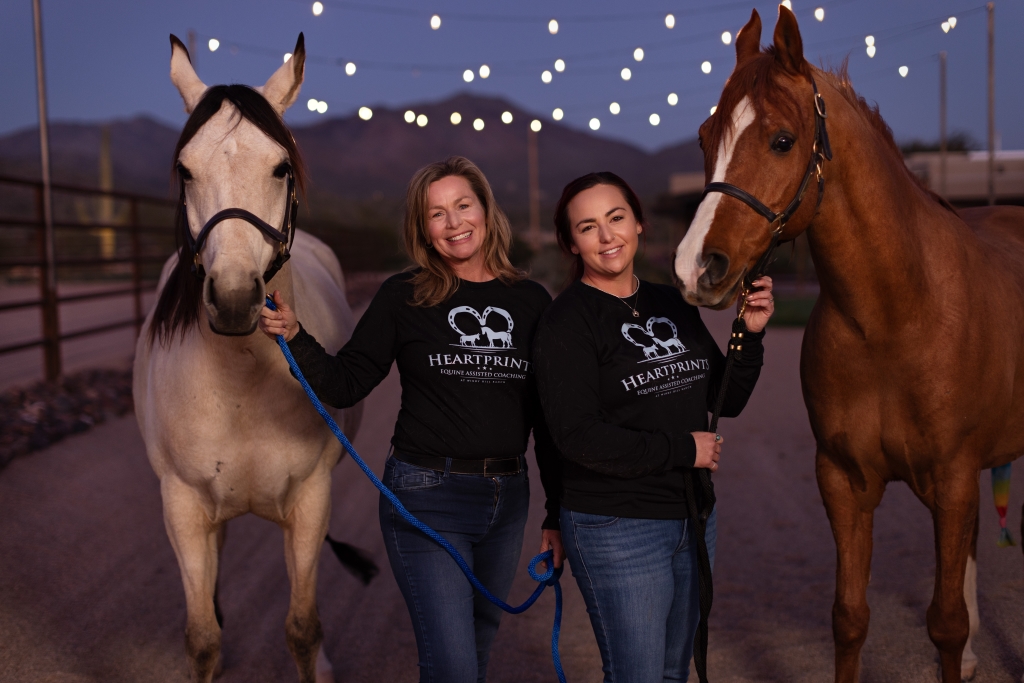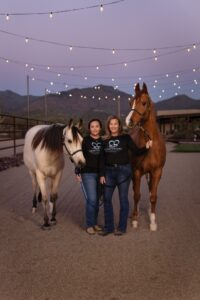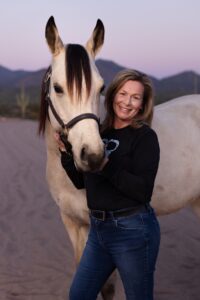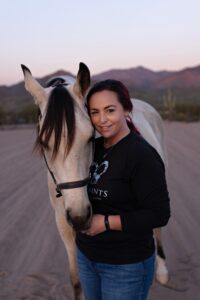Hoofprints & Heartprints

Writer Shannon Severson // Photography by Loralei Lazurek



The serene strength of a horse, observed from across a field or arena, is like a window into nature — unbothered by the stresses of the world, the rise and fall of human events, or even the relatively small details that can muddle our minds in a distracting quagmire of anxiety.
Mother and daughter Deb and Jess Steinbrink — each bringing their own training, perspective and heart for animals and humans — serve individuals and groups in a safe, nonjudgmental environment at Heartprints Equine Assisted Coaching.
Both Deb and Jess believe in the healing power of horses and stress that they are not therapists but have been trained in “The Freedom Way” of equine-assisted coaching to gently guide clients on their own healing journey.
Jess learned about equine-assisted coaching in college and earned her bachelor’s and master’s degrees in social work. This Illinois native has been riding horses since the age of 8 and found Arizona to be the ideal place to combine her hippophile nature and passion for helping others.
“I was always the stereotypical horse girl,” Jess says. “I was obsessed from the very beginning without knowing why. When I went away to college, it was the first time in my life that I didn’t have access to horses. I had mental health struggles and didn’t have my coping mechanism — which was horses — but I didn’t know that was my coping mechanism at the time.”
Deb has seen Jess and other family members benefit from being around horses and says that while she didn’t grow up riding, she always feels better as she leaves the barn.
“I’ve had a number of close family members struggle with addiction and anxiety,” Deb says. “There’s such a lack of quality care for them. To have equine-assisted coaching that is accessible and affordable … if I’m completely honest, it’s a God-led thing. Every step of the way, God has helped us find the right location, the right training — everything.”



Horse Sense
The benefits of time with a pet or companion animal are heavily supported by research and, likely, our own common sense. According to the Human Animal Bond Research Institute and Mental Health America, interaction with animals can alleviate stress, improve mood and fight depression, reduce loneliness, improve well-being and provide long-term help for those with mental health challenges. It is believed that the bonding hormone — oxytocin — is released when humans and animals interact.
Jess points out that, as horses are herd animals, it’s part of their DNA to sense what a human is feeling.
“[Horses] read the energy around them and react accordingly,” she explains. “We get clients who feel nervous at first and the horse senses that. As the person calms, the energy shifts.”
The sensitive nature of horses serves as a mirror — one that takes pressure off the client and coach.
“We lead from curiosity,” Deb says. “We ask questions, but we also read the horse’s behavior. We may take a moment to do a grounding exercise and say, ‘Something is happening with the horse. Let’s take a few deep breaths.’ They’ll notice the horse coming closer. We don’t have to say, ‘You seem nervous’ — the horse reflects it and will then react to that calming.”
Often, the women aren’t even privy to exactly what a client is going through. A few questions that encourage a person to witness what the horse might be sensing and how they might process those emotions being transmitted are all some people need.
“It’s part of the reason we picked this modality,” Jess explains. “I have the training, but I’m able to ask questions that guide the thought process. I don’t need to know all the details; we don’t have to be invasive. My horses and I are here to provide space for you to figure it out on your own. We are here to supervise the journey that you’re going to take for yourself.”
Everything about this ranch is built and designed for a welcoming, peaceful feel. The expanse of Arizona sky and views of striated red buttes and cacti surround the plateau on which it sits. There are comfortable outdoor gathering areas, mesquite trees that spread out their arms to grant verdant shelter from the sun, a garden, a breezy barn, turnout areas for the horses and a large arena with shade structures. When you set foot onto the Heartprints property, it’s already easier to breathe.
“When we found this property, it immediately felt like home,” Jess recalls. “The energy here and how it was laid out, the improvements the previous owners made … this place was meant to do [what we are doing here].”
A typical visit to Heartprints Equine Assisted Coaching begins with filling out some basic forms and a conversation about how comfortable the client is around horses. There is no horseback riding, just interacting as closely as the client is comfortable.
Heartprints Equine Assisted Coaching owns three horses, a bonded pair of donkeys, a pony and even a flock of chickens with which clients can interact. Deb and Jess are happy to accommodate individuals who might feel nervous around a large horse and emphasize that plenty of progress can be made with smaller four-legged and two-legged friends and it doesn’t even require stepping into the arena. Some clients prefer to connect over the arena fence or from a distance.
“Having the donkeys and pony was intentional,” Jess explains. “They’re smaller and less intimidating. A pony is essentially an extra-large dog. Once you adjust to that size, you can move up to the donkeys and then horses.”
She says people get over their fear pretty quickly as their preconceived ideas fade away, replaced by connections that almost seem magical.
“It’s uncanny,” Deb remarks. “The horse the client chooses that day will have the exact personality necessary for the interaction. The horse I would choose for them won’t be the one they’ll pick, but it will end up being the perfect session because that’s the horse they needed.”
Jess agrees, noting that often, a horse who can be goofy or stubborn may completely transform when paired with a client.
“The horses read and mirror what you need,” she says. “They get it in a way that is truly magical. It’s one of the coolest things for us. I know what this horse’s background is and how they normally behave; then I’ll get a client and the horse’s reaction will almost make me jealous! How did they bring that out in him? It’s cool to see that my horse has that in him. The horses are exactly what we need them to be.”



Healing on the Horizon
The Steinbrinks have witnessed important breakthroughs as they’ve worked with clients and friends of all ages. One young girl was so energized that the horses hesitated to come close. She had to learn that taking a deep breath, using a calming voice and making slower movements are better ways to attract friends of the equine or human variety.
In a group exercise, markers were used to write feelings and worries the participants wanted to release — which tended to be negative — on one horse. Positive things they wanted to invite into their lives were written on a different horse. The horse with the positive words stayed close to the group in one area of the round pen, while the horse with negative words walked far away and shook with all its might. Deb has observed this many times, noticing that a horse will “absorb” negative feelings from a human and then go and shake them off.
“It’s one of the most beautiful things I’ve seen,” she recalls. “When you see that, you realize how much negative emotions affect them, but also how they affect us. It’s the same with positive emotions. We get so busy and caught up in our own challenges and our own bubble of energy; it’s hard to see past that. When you see it reflected in a horse, there’s no judgment, but you can see how it affects you and others. Experiences like this get people away from their defense mechanisms to a place of clarity.”
Jess and Deb have several visions for the future of Heartprints Equine Assisted Coaching. They’re in the process of making it a nonprofit organization and hope to be able to help couples, families and corporate groups, not only individuals. Deb would love to use more of the property to incorporate a youth camp of some sort.
“I’ve always had it in my heart to use what I have to help others,” she says. “I also have a love for kids and have wanted to have a camp or a place for at-risk kids to come and enjoy. Some of my fondest memories are at farms or playing outside and being with animals. It’s something a lot of kids these days are missing.”
Whatever the future brings and whatever past hurts need to be worked through, the horses at Heartprints Equine Assisted Coaching stand waiting — their manes and tails tousled by the breeze, the sun glinting off their shiny coats — to be gentle tools of healing.

